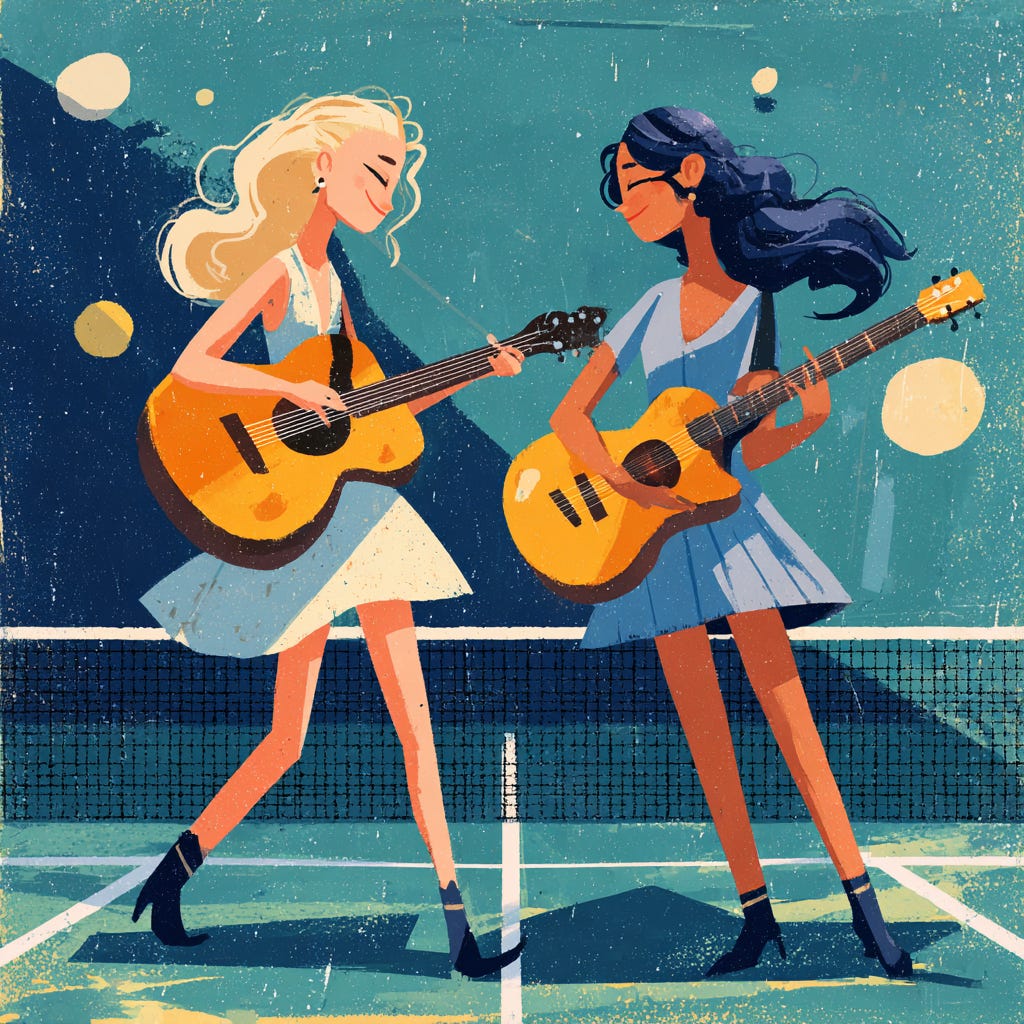Your Forehand, Your Rules: The Power of Playing Your Own Game
Why authenticity wins more points than perfection—on the court and in life.
“In terms of priority, inspiration comes first. You come next. The audience comes last.” – Rick Rubin, The Creative Act
Stuck on Repeat
I confess, I'm still in a full-on Rick Rubin phase. If you caught my piece last week, you know I’ve been bingeing—read last week’s full moon musings here.
I usually obsess when I'm excited about something new. Back in third grade it was “Love Will Keep Us Together” by Captain & Tennille. My best friend had the 45, and every time we went to her house, I begged her to play it on repeat… until she finally got annoyed and suggested I go home and listen to it there.
So, bear with me—this week it’s Rick Rubin, but it’s all in the spirit of loving the music (and wisdom) enough to play it on repeat.
When Doubles Gets Messy
If there’s one thing tennis (and my obsessive listening habits) has taught me, it’s that each of us has a different perspective.
No one sees the game—or life—the same way you do.
That means you’re unique, and your “sound” matters. But the minute we start bending ourselves into someone else’s expectations, we’re basically changing the radio station mid-song.
Instead of playing our own tune, we’re trying to guess what other people want to hear. And trust me, that’s not exactly “Two Tickets to Paradise” (Eddie Money would not approve, hehe).
Tennis teaches this quickly, especially doubles. The lines blur. Am I playing for myself, for my partner, for the team, or for those watching?
Often, this is when childhood tendencies show up. Maybe you overcompensate, try to “read minds,” feel the compulsion to fix or coach others, sneak in a passive-aggressive comment, insist on being “right,” or focus so much on someone else’s game you forget to play your own. Suddenly, your inner third grader is on the court with a whistle and a clipboard.
Before long, we’re not playing our own game. We’re tangled in someone else’s playlist.
Tuning Your Own Station
And if I'm honest here, sometimes you think your partner is the one out of tune, but maybe… it’s actually you. Ouch. (I’ve been there, arriving at a match without enough sleep or without meditating, and let’s just say my station is less cool jazz, more static.
So, what do we do when someone else seems out of tune? We show up week after week, hoping they adjust. Sometimes we ask politely, “Hey, maybe turn the dial a little?” But what happens when they can’t hear it? That’s where patience and clarity come in.
Rubin’s reminder is perfect here: inspiration first, you next, audience last. Focus on tuning your own instrument. Because the only strings you truly control are your own. Even if your partner can’t—or won’t—adjust, you can. And when you’re tuned, at least you know you’re adding harmony to the mix.
Still, that doesn’t always fix the disharmony. Maybe one player is blasting heavy metal while everyone else is on soft pop hits. Sure, it’s music, but is it the genre you want to keep listening to?
If your goal is to enjoy the game and create positive energy, you may need to decide what kind of music you want to be part of. That’s not judgment—it’s honesty.
The magic happens when everyone shows up tuned and true to themselves. Then the match becomes more than a match. It’s like taking four of your favorite songs and blending them into a completely different sound. Think of Vandelux’s remix of “Ain’t No Mountain High Enough” —the lyrics are the same, but the beat, the energy, the vibe… it’s totally fresh and new.
That’s what happens on the court when each player brings their own rhythm, creativity, and sound. You can’t plan it, and you definitely can’t fake it. It only happens when each player dares to play their own sound, not a cover version of someone else’s.
When each person cares enough to bring the best, most tuned-in version of themselves, the harmony starts to build. Once everyone is in sync with their own instrument, the collaboration can really begin. That’s when the game becomes alive—and suddenly it takes on a life of its own.
And the joy is real. Not every day on the court will be a top 40 hit. Some days the radio static is strong. But if you can laugh about it, “Yes, that’s me playing out of tune again because I woke up at 3 a.m.”, it keeps the vibe light. It keeps the game fun. And that’s really why we play.
Next time you step onto the court, or into any relationship, check your dial. Are you tuned into your own station, or switching channels to match someone else’s?
If you’re in tune, yay!
If you're feeling out of sync, you're not alone. Take a breath, clear the static, maybe do a shoulder shimmy, and hit play again.
Tennis isn’t about perfection, and life isn’t about pleasing everyone. It’s about the mix of energy, creativity, and joy that happens when you show up authentically.
And the best games, like the best songs, are the ones where you stop worrying about the audience, tune into yourself, and just play your own game.
….. until next time many many sweet blessings.
Love + Wellness to You!
Lynn
📖 Sneak Peek from My Upcoming Book
🎾 Drill Box: Play Your Own Game
Objective: Tune into your own strengths.
This Week’s Drill: Before your next match (or meeting/conversation), write down one thing you do well. Commit to leaning on it.
Rules: No comparisons, no dial-shifting.
Coach’s Tip: You’re not a cover band. Play your own sound.
Craving more? Find the rest of my energy musings here → 🏠 Frequency + Flow


